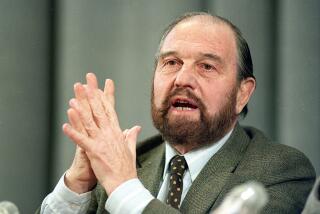KGB Setbacks Only Temporary, Defector Says
- Share via
Stanislav Levchenko, a former major in the Soviet KGB, says that any setback to Soviet spy activities in California caused by U.S. responses to the spy cases of the 1980s is probably only temporary.
Levchenko, under a death sentence imposed by the Soviet Union for defecting to the United States, says the Soviets will gradually replace any spies ousted from San Francisco and Washington two years ago or find other ways to carry on their espionage activities.
Because of difficulties in operating in the United States, the Soviets increasingly seek to recruit Americans overseas, Levchenko said in an interview in San Francisco.
Ouster of 13
Speaking of the ouster of 13 Soviet officials from the Soviet Consulate in San Francisco in 1986, Levchenko said:
“If most of those who left were intelligence officers, it severely disrupted their operation for a while. But the KGB is grown-up people. It’s a very pragmatic organization. What they will do, as assignments expire, more replacements coming back will be intelligence people.”
Levchenko, 48, ran a Soviet spy ring in Tokyo before his defection in 1979. He left his wife and son behind in Japan, under the illusion that no harm would come to them.
Instead, Levchenko said, his former wife was virtually ostracized from Soviet society. His son was tormented by teachers and schoolmates while growing up and was last reported to be serving in the Soviet army in Siberia.
Now a consultant to the U.S. intelligence and defense community and author of a recent book, “On the Wrong Side: My Life in the KGB,” Levchenko has become increasingly visible and outspoken in the last year despite continuing fears of possible assassination. He says he has declared a “personal war” on the KGB.
During the espionage trials of Richard W. Miller, the first FBI agent ever convicted as a Soviet spy, it was revealed that Soviet spies Nikolai and Svetlana Ogorodnikov had attempted to use Miller as well as a private attorney to locate Levchenko, presumably on behalf of the KGB.
Still cautious despite his increased visibility, Levchenko speaks seriously of such things as a Soviet agent killing an assassination target with a handshake.
“A few minutes later the assassin goes to the men’s room and washes his hands to get rid of a poison with a delayed effect,” Levchenko said. “The victim dies two days later of an apparent heart attack and the poison is virtually impossible to detect.
‘I Am Taking Chances’
“I know I am taking chances,” he added. “But my philosophy is not to be scared.”
In discussing the KGB’s activities in California, Levchenko said the emphasis at the Soviet Consulate in San Francisco is on the collection of scientific and technological information.
“The fact that 13 (from the consulate) had to go is a serious disruption,” he said. “Let’s say you are an intelligence officer. You may be working three agents, arranging dead drops, etc. Who will contact your people? It’s difficult, but not impossible.
“When you have a relatively small consulate, it is rather difficult to recruit people here in the first place,” Levchenko said. “What they can do is maintain contact with some of their recruits and use their East Bloc surrogates more.
“The KGB prefers to keep a low profile in the United States, anyway,” he said. “They prefer to recruit in third countries and then send them back here. More and more U.S. defense companies based in California have overseas operations.
“The Soviets are not fools. They are waiting in other countries where it is easier to operate.”
More to Read
Sign up for Essential California
The most important California stories and recommendations in your inbox every morning.
You may occasionally receive promotional content from the Los Angeles Times.









